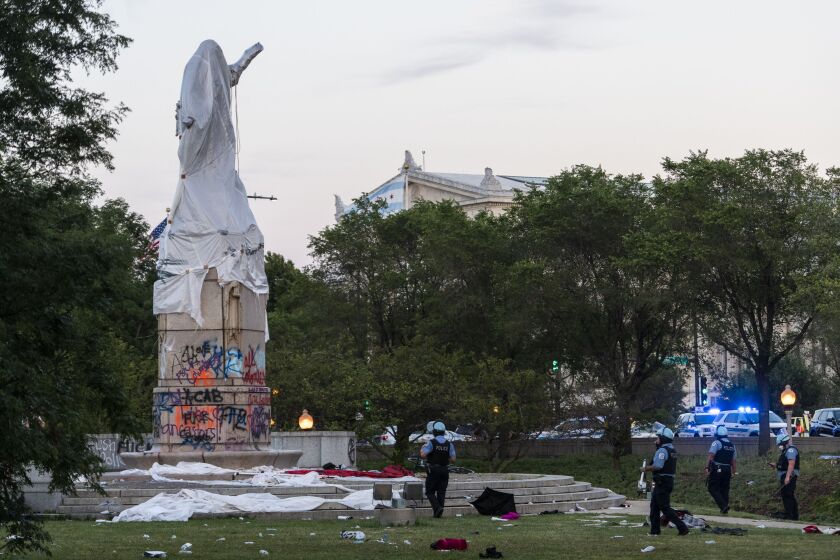Mayor Lori Lightfoot said Tuesday she has yet to see a plan that would allow statues of Christopher Columbus she ordered removed from Grant and Arrigo Parks two years ago to be safely returned to their pedestals without endangering Chicago Police officers.
Three days after her Monuments Commission released its long-awaited report recommending the Columbus statues be permanently sidelined — and the Balbo Monument in Burnham Park be removed — Lightfoot strongly suggested that the political hot potato would be punted until long after the Feb. 28 mayoral election.
Never mind that the Joint Civic Committee of Italian Americans is demanding that Columbus statues that became a favorite target of protests and vandalism during the civil unrest that followed the May 2020 murder of George Floyd be returned to Grant and Arrigo parks by Columbus Day and protected at city expense.
“Particularly with the statue in Grant Park, we have to have a safety plan that doesn’t put anybody at risk. If you go back and look at the videotape from when that monument and the police officers were under siege, there were so many things that could have gone wrong from a safety standpoint,” Lightfoot said Tuesday.
“We had people trying to scale the thing. Imagine if that statue had tumbled over with people trying to scale it. We had our police officers under siege. I’m never gonna put them in a situation where they’re literally risking their lives over a statue. That’s never gonna happen.”
Lightfoot reiterated that she doesn’t “believe in erasing history.” That’s why she’s been “talking to lots of folks about what can we do, how can we do it” to secure the Columbus statues.
But, the mayor also said, “Particularly with the statue in Grant Park, we have to have a safety plan that doesn’t put anybody at risk. ... I have not seen or heard of a single plan that could allow these monuments to go back outside and keep everybody associated with them safe.”
The Monuments Commission has also recommended that 41 of the 500 Chicago monuments deemed racist or insensitive be removed, moved elsewhere, replaced or altered to provide more context.
That includes a controversial recommendation to remove the limestone reliefs on the DuSable Bridge at Wacker Drive and Michigan Avenue depicting the Battle of Fort Dearborn.
The committee found that the works were created “within an allegorical narrative of the triumph of Western civilization [in which] American Indians are used as merely a foil to help define the heroic acts and qualities of colonizing forces.”
That won’t happen anytime soon, either.
“It’s easier to say, ‘This should go, that should go’ than make it happen. For example, the reliefs that are on the Fort Dearborn Bridge. Easier to say, ‘Let’s remove these because they don’t accurately reflect the true experience of Native Americans in our country and in our city. But, just the mechanics of doing that are very, very complicated,” the mayor said.
“So, I think the next step is really looking at, ‘Okay, if we’re gonna do these things, what is it gonna take? What’s it gonna cost? What’s the timeline?’ That’s the next step of that work.”
Lightfoot made it clear she does not agree with “everything” in the report she commissioned.
But, the mayor said she’s “excited” about the recommendation” to offer $50,000 grants for eight new art projects that might replace the monuments under review with an eye toward memorializing “events, people or groups that historically have been excluded or underrepresented.”
“I do think that there’s a dearth of work really memorializing the entirety of our history as a city. Making sure that we’ve got images that reflect — not only Native Americans [although] that would be a big step forward. But, we don’t have a lot of monuments to women. We don’t have a lot of monuments to other immigrants and refugees. We don’t have a lot of monuments to African Americans,” she said.
“The people who have, over history, contributed in a positive way to the fabric of our community. There are so few memorializations of those historical figures — sung and unsung. I think we have a real opportunity here. ... This is so much larger than whether there’s a Columbus statue in Grant Park,” Lightfoot said.
Ron Onesti, president of the Joint Civic Committee of Italian Americans, said Lightfoot’s plan to appoint yet another “working group” — and punt the Columbus statues hot potato until long after the mayoral election — may not be possible.
A court order may force the mayor’s hand by Columbus Day, Onesti said.
“We’re equally concerned about the safety and security of not only the statues but the citizens and the police specifically. Definitely, we want to address that. ... We’ve been asking for that. We thought it should come from the city. Since it’s been two years, we have taken it upon ourselves to start that ball rolling with suggestions from professional organizations and companies that do this kind of thing,” Onesti said.
“She’s not given us the respect of saying, ‘Let’s sit down with this group and work it out. Let’s come up with a resolve.’ It’s been, ‘The statues are down’ and no further information. Are they going up? Are they not? What do you need? Let’s work together and put a plan together. That’s what incited the lawsuit.”
To implement the security plan devised at the Joint Civic Committee’s expense would cost “anywhere from $10,000 to $100,000,” Onesti said.
The recommendations range from cameras, motion detectors and 24-hour guards to “plexiglass encasement” and “coatings” on the statues “so that clean-up is easier,” he said.





